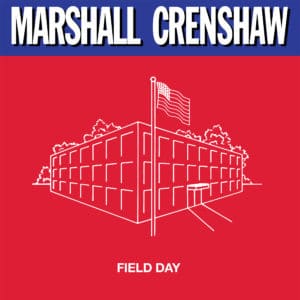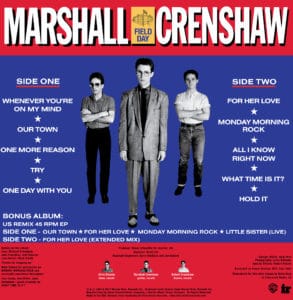Marketplace
2017 Intervention Records PRESSING
- Catalog Number IR-015
- Release Year 2017
- Vinyl Mastering Engineer Kevin Gray
- Pressing Weight 180g
- # of Disks 2
- Jacket Style Gatefold
- 100% Analog Mastering Yes
- Pressing Plant RTI
- Original Release Year 1983
- Original Label Warner
- Original Catalog Number 9 23873-1
When listening to this album I think of this band or music:
Marshall Crenshaw’s music takes in great AM radio pop spanning the 50s to the 80s. I think of Buddy Holly, the Beatles, or even Elvis Costello.
Music from this album would be a great soundtrack to this movie:
I’m surprised “Whenever You’re on My Mind” didn’t make it into a romantic comedy in the 80s. “Our Town” could serve as a great background to a coming-of-age movie about someone who moves to a city and misses home.
Marshall Crenshaw’s first album was universally praised upon release in 1982. His command of pop song melody and structure, as well as his knowledge of rock n’ roll, went back to the beginnings and coursed through his songs. Field Day, which followed a year later, wasn’t quite as generously received, but holds up remarkably well. While Steve Lillywhite’s production alienated some critics, Crenshaw always liked it—and most of his fans didn’t give it a second thought.
Field Day contains nine songs as strong as any on his debut as well as a savvy cover of “What Time Is It?,” originally a minor hit for the Jive Five. Kevin Gray’s remaster of the album for Intervention Records retains the excitement and drive of the original while giving instruments more space to make their mark. He also remains true to Lillywhite’s detail-dense production even has he delivers a bigger soundstage.
The guitars on “Whenever You’re on My Mind” remain bright and shimmering, but less glassy at the top end. All the instruments on the album have more air around them, which allows Chris Donato’s bass pop and Robert Crenshaw’s drums to register more firmly while retaining a largeness of scope. Crenshaw’s double-tracked voice on the chorus of “Whenever You’re on My Mind” feels crammed on the original LP, but the remaster puts room between each voice.
Similarly revealing, on the original, Donato’s bass on “Our Town” is in danger of getting lost in the punch of the kick drum. Here, the low-toned sounds get their own individual spaces. The kick drum comes across with extra forceful and multi-dimensionality, and each bass passage registers with more power. And while the guitar notes on “One More Reason to Cry” seem to bleed into one other on the original, they get room to stretch out on the Intervention Records LP. Other details abound.
Harmony vocals that constitute an indistinct block of sound on the Columbia Records pressing gain layering and depth. Guitar solos are more subtly presented. And even as there’s nothing especially flashy about the solo on “For Your Love,” each chord convincingly resonates and the solo jumps out of the soundstage. Throughout, Crenshaw’s rhythm guitar parts are unusually sophisticated. You can now easily detect the chord changes.
Because many early reviews of Field Day negatively reacted to the production, Warner Brothers cut an E.P. for the U.K. market that used a radically different sonic approach. It toned down and softened a mix of the songs from the original album. Intervention includes it here as a bonus 45RPM LP. However enjoyable, especially the extended mix of “For Your Love” that consumes side B and the live version of Doc Pomus’ “Little Sister,” it nonetheless shows the wisdom of Lillywhite’s method. The original recording jumps out of the speakers and grabs you. Kevin Gray deepens it and makes it richer.
RTI’s pressing is quiet and flat, and authoritatively conveys the music’s subtlety. The gatefold cover features new art (it was originally used for the seven-inch single of “Whenever You’re on My Mind”) chosen by Crenshaw and the tip-on printing by Stoughton blows away the artwork on the original jacket. As the years pass, Field Day justifies the A+ rating famed Village Voice critic Robert Christgau awarded it in his original review—a fact made clearer by this first-class release.
*VinylReviews.com is owned and operated by Intervention Records’ Founder Shane Buettner.
Field Day Expanded Edition



 4.5
4.5



